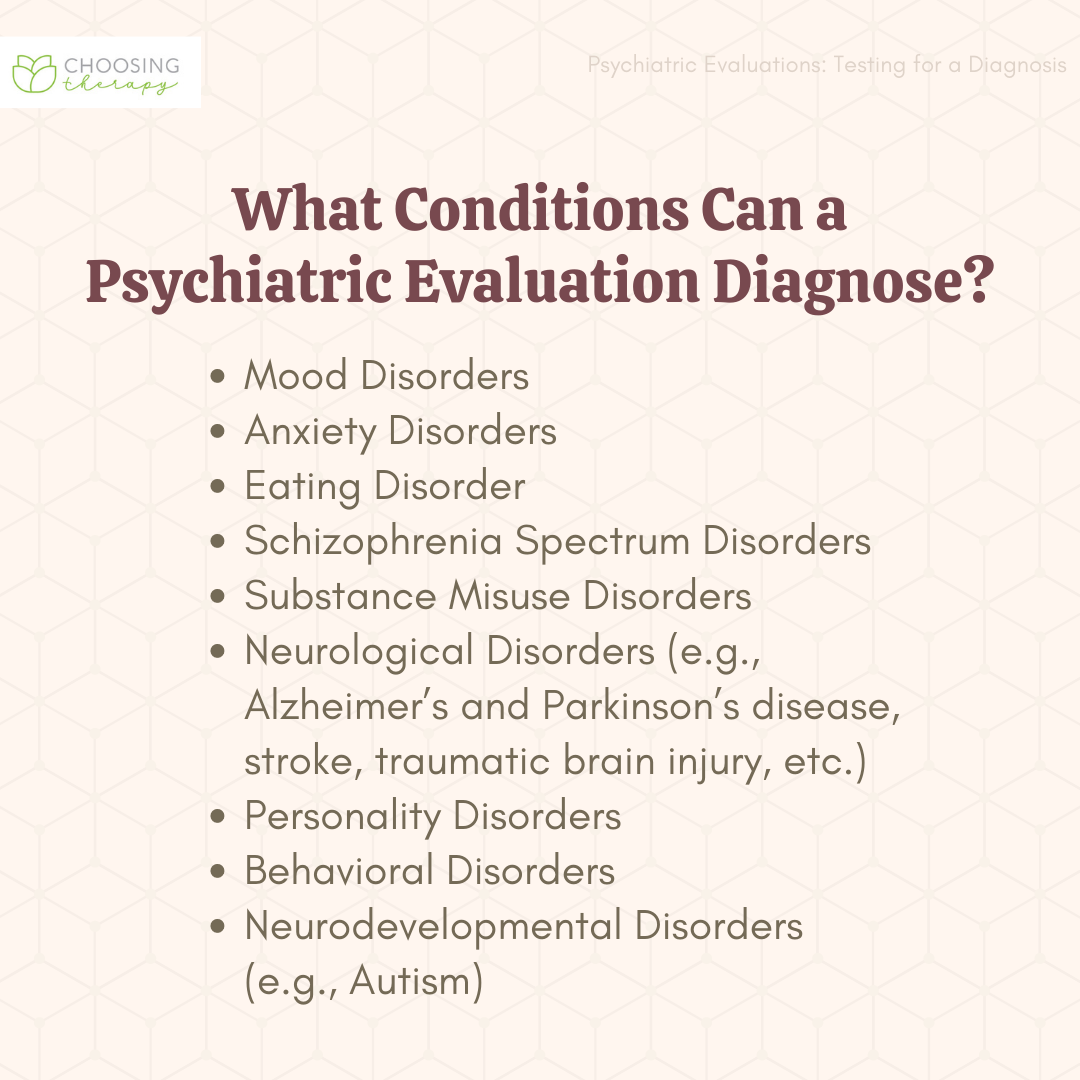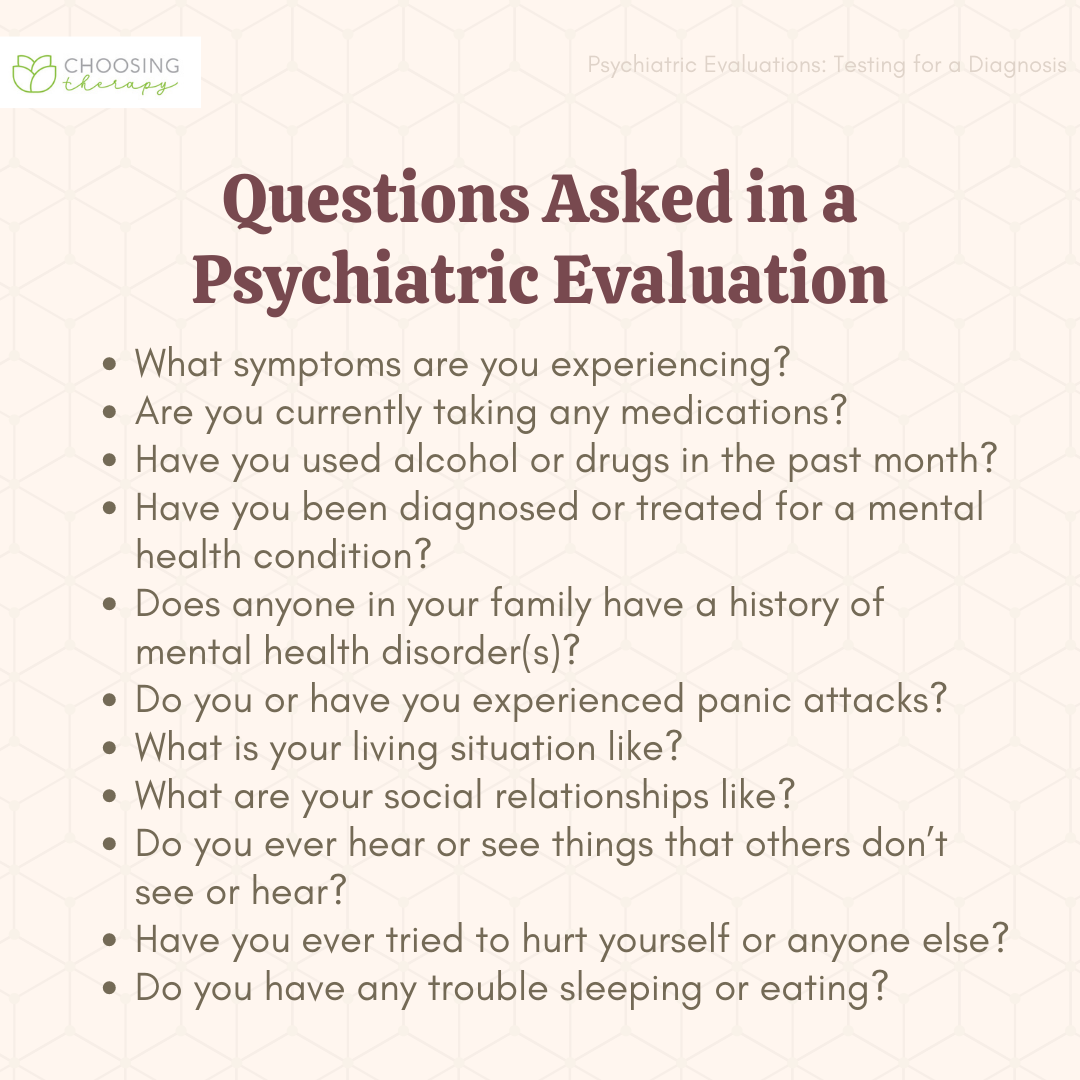
A psychiatric evaluation is an assessment performed by a mental health professional to diagnose and guide treatment decisions. However, they are also used for scientific, educational, occupational, and legal purposes. The format varies depending on the objective but typically involves answering questions about your medical history, family background, and recent symptoms and engaging in basic cognitive and motor tasks.
What Is a Psychiatric Evaluation?
The primary aim of a psychiatric evaluation is to create an accurate understanding of a person’s symptoms that can help diagnose mental health conditions and treatment decisions. Usually administered by a psychiatrist, clinical psychologist, or neuropsychologist, the evaluation also allows the mental health professional to discuss concerns and answer questions a person may have. Evaluations may also be requested for non-clinical purposes, such as to fulfill occupational or educational requirements.
Who Might Need a Psychiatric Evaluation?
A psychiatric evaluation may be recommended for both clinical and non-clinical purposes. Clinically, anyone concerned about their mental health or has noticed changes in their thoughts, feelings, or behavior (e.g., paranoia, confusion, persistent insomnia) may benefit from an evaluation. Sometimes a concerned loved one or friend will be instrumental in obtaining an evaluation when symptom awareness is lacking (e.g., psychosis, dementia).
Even if symptoms are mild, a clinician may recommend an assessment to establish a baseline to compare future changes. This is especially the case with degenerative conditions like Parkinson’s or Alzheimer’s disease. Non-clinically, neuropsychological or psychoeducational assessments may be sought for academic placement, learning accommodations, job requirements (e.g., returning to work after head injury), or legal purposes (e.g., guardianship, criminal court case).
What Conditions Can a Psychiatric Evaluation Diagnose?
A psychiatric evaluation comprises several components that, when reviewed together, can help a clinician diagnose a mental health or related medical condition. The clinician will typically use assessment tools (e.g., clinical interviews, standardized neuropsychological tests, rating scales, and questionnaires) appropriate for the person’s age and capability, with accommodations being made as needed (e.g., hearing impairment).
To arrive at a diagnosis, the practitioner will assess the information gathered during the evaluation and may request additional medical tests (e.g., brain imaging, urine, or blood tests) to rule out other conditions. Diagnoses assessed through psychiatric evaluation can include mood disorders, anxiety disorders, psychotic disorders, neurodegenerative disorders, personality disorders, substance use disorders, and behavioral disorders.
A psychiatric evaluation may provide a diagnosis of:
- Mood Disorders (e.g., Depression, Bipolar Disorder)
- Anxiety Disorders (e.g., Generalized Anxiety Disorder, OCD, PTSD)
- Eating Disorders (e.g., Anorexia and Bulimia Nervosa)
- Schizophrenia Spectrum Disorders
- Substance Misuse Disorders (e.g., Alcohol Intoxication)
- Neurological Disorders (e.g., Alzheimer’s and Parkinson’s disease, stroke, traumatic brain injury, etc.)
- Personality Disorders (e.g., Borderline Personality Disorder)
- Behavioral Disorders (e.g., ADHD)
- Neurodevelopmental Disorders (e.g., Autism)
What Are the Types of Psychiatric Evaluations?
The term “psychiatric evaluation” is an umbrella term to describe an assortment of examinations to assess an individual’s mental status, mental health, neurocognitive functioning, academic potential, personality, and aptitudes. A psychiatric evaluation can take many forms, depending on the referral question and the environment in which it is given (e.g., an emergency room versus a doctor’s office).
The three main types of psychiatric evaluations are:
1. Clinical Psychiatric Evaluations
Clincial evaluations are the most common type of psychiatric evaluation and are performed when there is a specific health-related determination to be made. Most often, this relates to an individual’s mental health, but evaluations to help determine an individual’s sobriety and orientation, neurological functioning, and cognitive wellness are also common.
Subtypes of clinical psychiatric examinations include:
- Outpatient Mental Health Evaluations: When an individual is experiencing a mental health symptom (e.g., depression, anxiety, psychosis, etc.) that interferes with their quality of life or daily functioning, they typically seek an outpatient mental health evaluation with either a clinical psychologist or a psychiatrist. Evaluations of this sort can take many different forms but usually begin with a clinical interview of the patient and sometimes their family members. To supplement the interview, psychologists and psychiatrists may sometimes seek medical testing to rule out several general medical conditions as the cause of the patient’s symptoms before settling on a psychiatric diagnosis in the DSM 5. In addition, when a diagnosis is unclear, practitioners may also use clinical scales, like the Beck Depression Inventory (BDI), Minnesota Multiphasic Personality Inventory (MMPI), and sometimes even the Rorschach Inkblot Test.
- Emergency/Inpatient Evaluations: Emergency evaluations are conducted when a person is experiencing severe mental health symptoms and may be at risk for harming oneself or others. Usually performed in a hospital emergency room or psychiatric hospital, this type of psychiatric evaluation is brief and designed to assess the patient to help in stabilization quickly. Often acute trauma, substance use, and/or the onset of a psychotic episode are reasons for this evaluation.
- Neurocognitive Evaluations: Neurocognitive evaluations can be performed by neurologists or neuropsychologists, depending on the specific referral question. They are typically performed when a mental health professional suspects that an individual’s aberrant behavior, thinking, or functioning may be caused by something pathological in that person’s brain anatomy, physiology, or vascular function. Causes of such brain pathology could be congenital/developmental or related to a vascular event (e.g., stroke), disease (e.g., Alzheimer’s or Parkinson’s, or brain tumor), or a traumatic brain injury (TBI). Neurocognitive evaluations performed by neurologists often involve brain scans (e.g., MRI, PET, etc.). Neuropsychologists’ tests involve testing to assess attention, memory, motor functioning, specific cognitive skills, verbal fluency, and executive functioning.
2. Performance-Based Psychiatric Evaluations
Performance-based psychiatric evaluations are given when a determination must be made about a person’s cognitive, functional, or behavioral performance in a given academic or occupational setting. When given for an academic purpose, the examination is often called a psychoeducational evaluation. The goal in this case is to assess a child’s learning/development level and their strengths and weaknesses for optimal academic placement and accommodations. Typically done by a clinical neuropsychologist, psychoeducational testing could be used to identify the presence of giftedness, as well as of a learning disability (e.g., dyslexia, ADHD) or a developmental problem (e.g., autism spectrum disorder).
Alternatively, performance-based testing can be provided for occupational purposes. Several occupations require periodic testing for vigilance, stress, and mental acuity, particularly for jobs having a high level of importance to the general public, such as law enforcement, public transportation, and air traffic control. Clinical neuropsychologists often do performance-based testing for individuals in these jobs.
3. Forensic Evaluations
Forensic evaluations are conducted in legal cases to assess a person’s mental health status or to provide an expert opinion in court. The assessment may include an evaluation of competency and behavioral risk and may be used to determine criminal responsibility. Additionally, forensic evaluations are used in family court to determine whether a parent is stable and competent enough to have custody of their child — either in a custody battle with another parent during a divorce or, when contested by a government organization, like child protective services (CPS).
Types of Psychological Tests Included
There is no shortage of psychological tests designed to assess mental activity. The selection of tests will vary depending on the purpose. For example, an emergency evaluation may include the brief Mini-Mental-State Exam. Alternatively, an intake for psychotherapy may involve a more comprehensive battery of projective, personality, and mood-related tests.
People are sometimes worried about not performing well on a particular test. However, they should know that an evaluation is usually made concerning a larger context, including age, demographics, family history, medical test results, etc. A psychological test is merely one of several tools a practitioner uses to aid in the diagnostic process.
Personality Tests
Personality Tests measure a person’s personality traits, characteristics, tendencies, and behaviors. They can be short (e.g., under 10 minutes) or long (over an hour) depending on the purpose and the setting, and are usually in the form of a questionnaire or inventory. Even though these tests are measuring personality characteristics, they are descriptive in nature, and as such, there is no right or wrong answer.
Clinically, personality tests can be helpful to the therapist — both diagnostically and therapeutically — helping to structure and optimize therapy to fit the patient. Non-clinically, these tests are widely used in research settings, as well as for occupational and academic self-exploration purposes (e.g., to guide what type of job would bring contentment and fulfillment).
Some examples of personality tests include:
- Minnesota Multiphasic Personality Inventory (MMPI): The latest version, MMPI-3, is a questionnaire that takes 25-50 minutes to complete and is commonly used for persons 18 years and older in mental health, forensic, research, and occupational (e.g., job candidacy for public safety jobs) settings. There are both paper-and-pencil and computerized versions.1
- Big Five Inventory-2 (BFI-2): The BFI-2 is a 60-item questionnaire (shorter versions of 30 and 15 items are also available) that asks the individual to agree or disagree with various statements (e.g., “worries a lot”) that assess five main aspects of personality: Extraversion, Agreeableness, Conscientiousness, Negative Emotionality, and Open-Mindedness. The BFI-2 is most commonly used for research and personal exploration.2
- Specific Trait Tests: There are several tests that are geared to assess specific traits, such as the Hare Psychopathy Checklist-Revised (PCL-R) and Psychopathic Personality Inventory-Revised (PPI-R) for forensic purposes, or the Narcissistic Personality Inventory (NPI) which measures narcissism.
Clinical Symptom Scales
Clinical symptom scales measure specific symptoms (like depression, anxiety, attention, and activities of daily living). Usually, these scales are self-report measures asking people to rate their level of impairment or functional ability. A weakness of many scales in this category, as with all so-called “objective tests,” is that they are prone to respondents faking good (i.e., under-reporting their symptoms because they are trying to avoid a diagnosis) or faking bad (i.e., over-reporting their symptoms, often to get medication or another secondary gain). However, some clinical symptom rating scales are correct for this using validity subscales.
A few examples of clinical symptom scales include:
- Beck Depression Inventory
- State-Trait Anxiety Inventory
- Conner’s 3 Self-Report (for ADHD)
- Vineland Adaptive Behavior Scales (for activities of daily living, autism, and other developmental disabilities)
- Millon Clinical Multiaxial Inventory (for multiple mental health disorders)
Projective Tests
Projective tests are assessment tools used by psychologists — particularly those trained in a psychoanalytic/psychodynamic style — during a therapy session or forensic evaluation to gain insight into a person’s personality, emotions, attitudes, and mental state. Test items are open-ended and exploratory in nature. They may require the person to describe or tell a story about ambiguous images or express it through drawing objects or scenes.
These tests are based on the assumption that people project their unconscious thoughts, feelings, and conflicts onto ambiguous stimuli. Despite being criticized for the high degree of subjectivity in interpreting results, they can be therapeutically useful in helping people express thoughts, feelings, and themes that may need contemplation. Interpretation of projective tests is more of an art than a science. Still, for those who have refined the art of projective test interpretation, these tools can help them discover things (otherwise obscured by one’s defense mechanisms) that more straightforward tests might not pick up.
Examples of projective tests include:
- Rorschach Inkblot Test: A person is shown a series of abstract inkblot images and, for each one, is asked to express what they see. The practitioner evaluates the content of the description along with nuances in the expression of the content (e.g., gestures, intonation, emotionality).
- Thematic Apperception Test: A person is shown a series of pictures and asked to tell a story about what they see. The practitioner may prompt the person to consider what led to the depicted scene and how the story might end.
- House-Tree-Person Test: As the name implies, the person is asked to draw a house, tree, and person, and the psychologist then follows up with questions about the drawing, such as: Who lives in the house? This test can be particularly useful with children or others with difficulty reading or verbal expression.
Neuropsychological Tests
Neuropsychological tests evaluate a person’s cognitive and behavioral functioning, including attention, memory, decision-making, language, perception, and spatial and motor ability. Performed by a trained neuropsychologist or clinical psychologist, usually in an office, clinic, or hospital setting, these tests detect and measure deficits and impairments for diagnosis, treatment, and monitoring changes over time with reassessment.
The selection of tests performed will vary with the purpose, person’s age, and other considerations and can last several hours, although sometimes they are divided into multiple shorter sessions. After completion, the results of the tests are evaluated within the context of other information (e.g., medical history, symptoms, medical tests) gathered to arrive at a diagnosis. Neuropsychological tests are also widely used in research studies as they provide objective, quantifiable data to better understand normal and abnormal brain function and treatment efficacy.
A few examples of neuropsychological tests include:
- Mini-Mental State Examination (MMSE): The MMSE is a brief (5-10 minute) screening test administered by a medical professional to assess cognitive function and is often used to screen for dementia and head injury/concussion.3
- Wechsler Adult Intelligence Scale (WAIS): The WAIS is a comprehensive test of cognitive function and intelligence that includes many subtests in which a person is asked to complete tasks of gradual increasing complexity (e.g., solve puzzles, remember and repeat numbers, draw objects). There is a children’s version called the Weschler Intelligence Scale for Children (WISC).4, 5
- Wisconsin Card Sorting Test (WCST): The WCST measures executive functioning, such as being able to shift cognitive strategy and adapt to changing rules.6
- Boston Naming Test: This test assesses language ability and a person’s ability to name objects.7
- Trail Making Test: This test assesses attention and visual-motor coordination and involves connecting numbered and lettered dots in a specified sequence (e.g., like the childhood “connect-the-dots” game).8
Intelligence, Aptitude & Achievement Tests
Within the context of performance-based evaluations, especially for psychoeducational evaluations, tests of intelligence/aptitude and achievement are used to assess for giftedness, as well as for the presence of a learning disability. Intelligence tests gauge an individual’s general cognitive potential or aptitude, as well as one’s intelligence or aptitude in other, more specific domains, such as verbal, nonverbal, fluid, and crystalized areas of functioning. Examples of these tests include the Wechsler Intelligence Scale for Children (WISC), the Stanford Binet test, and the Woodcock-Johnson test.
In contrast to intelligence tests, which gauge one’s potential, achievement tests gauge the abilities and knowledge an individual has acquired, particularly from school. Examples of achievement tests include the Wide Range Achievement Test (WRAT) and the Woodcock-Johnson Test of Achievement. When an individual’s performance on achievement tests is significantly lower than estimates, based on their performance on intelligence tests, this indicates that a learning disability might be present.
Direct Observation Tests
Direct observation tests involve observing a person’s behavior or performance in a specific situation or setting, such as a classroom, clinic, or home. The session may be structured with the participants asked to engage in a specified task (e.g., Parent-Child Interaction Assessment) or unstructured with no specific instructions. Direct observation tests can be particularly helpful for diagnosing pediatric disorders like autism spectrum disorder, where social skills may be deficient, or for assessing family dynamics for use in family therapy.
How Are Psychiatric Evaluations Performed?
A psychiatric evaluation can last between one and three hours. Sometimes the evaluation will be performed in multiple shorter sessions. Before the evaluation begins, it is crucial to disclose your concerns about the process and tell the practitioner about any factors affecting your ability to participate fully, such as drug use, hunger/thirst, lack of sleep, or anxiety.
The evaluation usually begins with a clinical interview, a conversation between the mental health professional and the patient, to gather information about the person’s symptoms, medical, family, and substance use history, and other relevant factors.
Although there are guidelines for the evaluation, the practitioner may make adjustments as needed to accommodate the individual, such as taking bathroom or snack breaks or modifying the length of the session.
Some questions you may be asked in a psychiatric evaluation include:
- What brings you here today?
- What symptoms are you experiencing?
- Are you currently taking any medications?
- Have you used alcohol or drugs in the past month?
- Have you been diagnosed or treated for a mental health condition?
- Does anyone in your family have a history of mental health disorder(s)?
- Do you or have you experienced panic attacks?
- What is your living situation like?
- What are your social relationships like?
- Do you ever hear or see things that others don’t see or hear?
- Have you ever tried to hurt yourself or anyone else?
- Do you have any trouble sleeping or eating?
How Do I Prepare for a Psychiatric Evaluation?
Psychiatric or psychological evaluations are intended to assess your mental status to help you either with the diagnosis and treatment of a condition or improve your quality of life. You can not study for these tests. However, there are things you can do in preparation to ensure it is valid and productive.
Some things you can do to prepare for a psychiatric evaluation include:
- Make a list of symptoms and questions: Take some time before the evaluation to make a list of symptoms you’ve been experiencing as well as any questions you may have. Sometimes people have difficulty remembering symptoms or questions when meeting with the doctor, and this exercise helps to ensure you don’t forget and can take the pressure off to remember on the spot. This is especially important in cases where confusion and forgetfulness are the symptoms prompting the evaluation.
- Compile a list of medications and vitamins: Bring a list of medications and vitamins you are taking, including dosage and prescriber information. Keeping such an updated list in your wallet, in general, can be a good idea, especially for emergency situations where your awareness is compromised.
- Evaluator qualifications: Research the qualifications of the professional conducting the evaluation. It should be a licensed psychologist, neuropsychologist, or psychiatrist.
- Logistics: Figuring out the location and transportation logistics ahead of time can reduce stress on the day of the evaluation and help you to arrive on time. You may want to ask the practitioner’s office ahead of time if a family member should accompany you. If your evaluation is virtual, ensure that you have a quiet space without distraction from which to engage, and ask others in your living space to respect your privacy during your meeting.
- Cost: Find out how much the evaluation will cost and whether it is covered by your insurance or the requesting party (e.g., employer, school, etc.).
- Accommodations: Discuss with the provider any accommodations you may need, such as an interpreter if the language spoken by the practitioner is not your primary language. Remember to bring eyeglasses, hearing aids, or any device you may need to hear, read and communicate.
- Eat and hydrate: Some evaluations can be lengthy, upwards of 3 hours, and having breakfast or bringing a snack can help ensure that your results accurately reflect your mental state without being ‘hangry.’
- Educate yourself: The fact that you are reading this article shows that you are already trying to understand the process of what a psychiatric evaluation entails which can alleviate any anxiety and uncertainty you may be feeling. In addition to this article, you may want to explore trusted resources, such as Choosing Therapy or not-for-profit organizations with information from vetted medical professionals, to learn more about mental health conditions and available treatments, which may prompt questions you want to ask your doctor.
- Calm nerves: Try not to be nervous and remember the goal of the evaluation is to help you. If you do feel nervous, let the practitioner know at the beginning. Usually, these evaluations occur in a comfortable setting and begin with a relaxed conversation with the opportunity to express concerns. However, you may consider using relaxation strategies such as deep breathing, meditation, or light stretching before your appointment.
What Happens After a Psychiatric Evaluation?
After a psychiatric evaluation is conducted, the mental health professional will review the gathered information and make a diagnosis. In some cases, additional tests may be required to rule out certain medical conditions before a diagnosis can be established. Based on the diagnosis, the practitioner can develop and recommend a treatment plan tailored to the individual’s needs and circumstances to help the person manage their symptoms and improve overall well-being.
A treatment plan may include a variety of interventions, such as individual, family, and/or group psychotherapy, skills training, medication (or a referral to a psychiatrist or nurse practitioner if a psychologist performed the evaluation), rehabilitation services (in the case of substance misuse disorder), and recommendations for occupational or educational accommodations. For individuals with severe symptoms, recommendations for a living environment that provides special services (e.g., group home) may be part of a treatment plan.
How to Schedule a Psychiatric Test
There are several ways to find a mental health professional to perform a psychiatric evaluation or related test. One option is to ask your primary care physician for a referral. There are also online resources and directories that can help connect you with a practitioner in your community. Community hospitals, counseling centers, and schools may also provide evaluation services or be able to refer you to a professional in your area. You must choose a mental health professional who is licensed, qualified, and experienced in conducting the type of evaluation you need.
Final Thoughts
Psychiatric evaluations performed for diagnostic purposes can be divided into three types: clinical, performance-based, and forensic. In each case, related medical conditions need to be accounted for before settling on a diagnosis. Though various tests and measures can assist mental health professionals in making diagnoses, there is no substitute for the expertise offered from clinical experience, as all tests and measures are subject to limitations and biases.








